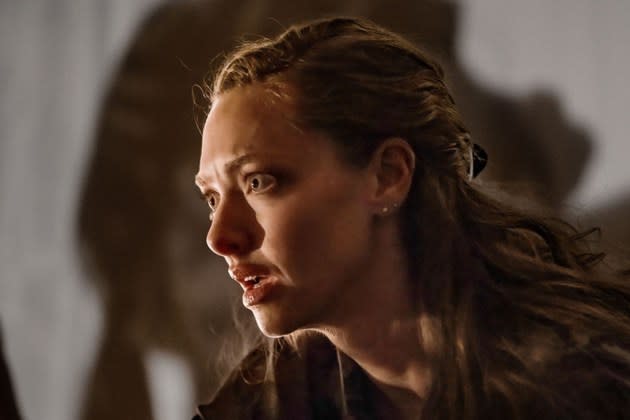‘Seven Veils’ Review: Amanda Seyfried Impresses in Atom Egoyan’s Ambitious Take on ‘Salome’

Art and life are inextricably entangled in Atom Egoyan’s Seven Veils, a wildly ambitious, visually intoxicating reinterpretation of the Richard Strauss opera, Salome, that proves to possess almost as many layers as the Biblical princess’ famous dance routine.
After spending the past two and a half decades struggling to get his groove back following the 1997 success of The Sweet Hereafter, the filmmaker reconnects with his pet themes of alienation and family trauma, taking inspiration from his own revisionist staging of the opera, which he remounted for the Canadian Opera Company earlier this year. Using that production as a leap-off point, Egoyan interweaves a behind-the-scenes narrative involving a young director (Amanda Seyfried) who is challenged to put her own stamp on the oft-interpreted material while exorcising a number of personal demons in the process.
More from The Hollywood Reporter
Handed its world premiere at the Toronto International Film Festival at the very same venue that played host to Egoyan’s COC production just six months ago, the densely theatrical film returns Egoyan to his comfort zone while allowing him to examine more contemporary issues, such as artistic appropriation.
Seyfried, previously directed by Egoyan in the steamy, divisive 2009 arthouse thriller Chloe, capably embraces the complexities of her character, Jeanine, who has been asked to oversee a Salome revival by her late mentor Charlie, with whom she had a complicated professional and personal relationship. Eager to do justice to his wishes, while also wanting to make a few tweaks of her own that constantly put her at odds with the performers and the intrusive opera company brass, Jeanine presses ahead. The experience continually peels back layers of long-repressed personal trauma at the hands of male authority figures, which, in turn, manages to be incorporated into the new production.
Adding to all the backstage drama is Clea (Rebecca Liddiard), the props manager who’s angling to find a way for her girlfriend, Rachel (Vinessa Antoine), who’s understudying role of Salome, to get her shot in the spotlight. Back on the domestic front, Jeanine has reason to believe that her husband, Paul (Mark O’Brien), is having an affair with her senile mother’s caregiver. Then, as rehearsals continue, there’s a palpable spark between Jeanine and Luke (Douglas Smith), an old friend who is understudying the role of John the Baptist. Well before Salome shocks the audience by passionately snogging John the Baptist’s freshly severed head, Jeanine begins to wonder if she’s too far in over her own.
Given all the thematic echoes and reverberations, at times the proceedings can feel a bit Everything Salome All at Once. But Egoyan and his muse adroitly keep all those moving parts humming along, incorporating the theater’s rehearsal bridge (located between the audience and the backstage area) as an effective metaphor for the nebulous division between Jeanine’s two different worlds.
Essentially serving as a constant spectator, looking in on both the production and her own tangled life, Seyfriend impressively conveys a myriad of tamped-down, long-repressed emotions with an economy of dialogue at her disposal. Upping the opera cred is the casting of Ambur Braid and Michael Kupfer-Radecky, who both starred in Egoyan’s most recent staging of Salome (he first directed the opera back in 1996), but play fictional actors here, with Kupfer-Radecky clearly enjoying taking on the role of Johan, a self-important, womanizing jerk.
Phillip Barker’s production design is sumptuous and at times just a little bit sinister, with flickers of images projected across undulating backdrops conveying shadowy hints of German Expressionism. Mychael Danna’s admirably low-key score knows better than to try to compete with all those grand operatic flourishes.
Best of The Hollywood Reporter

 Yahoo News
Yahoo News 